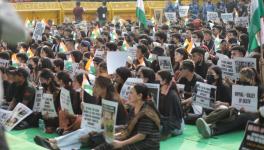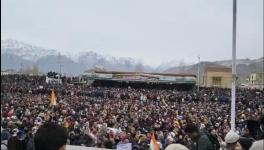Delhi HC Hears Internet Freedom Foundation's Petition on e-Surveillance, Directs CIC to Take Action

Image Courtesy: Daily Pioneer
The Delhi High Court on Tuesday, November 12, directed the Central Information Commission (CIC) to tell the Court a timeline within which the Internet Freedom Foundation's (IFF) appeal to access information relating to the scope and scale of e-surveillance conducted by the Ministry of Home Affairs (MHA) will be decided.
The IFF has been pursuing information relating to the scope and scale of e-surveillance conducted by the Ministry of Home Affairs since December 2018. IFF had filed six RTI applications in December 2018, seeking information about Electronic Surveillance orders passed under Section 69 of the IT Act.
The Union Government at first denied the information on the grounds of national security. Thereafter, on appeal, when the matter was remanded back, the information was denied on a new ground— the government claimed that records pertaining to the information sought were destroyed as per 'extant' provisions (without providing the provision).
When IFF further appealed against this order in August 2021, before the CIC, they did not get any date for hearing due to the huge case pendency and unfilled vacancies in the CIC, owing to which the matters are only being listed after two years of filing.
IFF said in a report, "Three years have passed since the filing of the RTI applications, and we apprehend that the information sought is being continuously destroyed during the pendency of the RTI proceedings. Therefore, we have approached the Delhi High Court to expedite the process and to seek information on Electronic Surveillance, which impacts the fundamental rights of all citizens of the country."
The Delhi High Court finally heard the matter on Friday. Senior Advocate Trideep Pais appeared on behalf of the IFF and submitted that the information sought from the MHA does exist with the MHA and prayed that it be protected from destruction during the pendency of these proceedings. He also raised the issue of the delays in the CIC.
After hearing both sides, Justice Yashwant Varma directed the Counsel for the Respondent to take instructions from CIC regarding the time frame within which the pending second appeal would be decided. The matter has now been posted for December 2, 2021.
The RTIs filed by the IFF aimed to understand the adequacy and functioning of the legal supervisory mechanisms for the interception, monitoring, or decryption of electronic information under the Information Technology (Procedure and Safeguards for Interception, Monitoring and Decryption of Information) Rules, 2009 ("2009 Interception Rules"). The six RTI applications were filed on December 28, 2018.
IFF argued that even though the MHA denied the information because of 'security reasons', similar information on Electronic Surveillance had previously been made available in the public domain—the Union government has, on several occasions (in 2011, 2014, 2015 and 2019) disclosed information similar to that sought by IFF in response to other RTI applications, to a question posed in the Parliament and in a counter-affidavit filed in another matter. "Therefore, it cannot, now, refuse to disclose the information sought for security reasons," IFF said.
After the next appeal, the government claimed that the information being sought had been destroyed. IFF argued that the destruction of data during the pendency of RTI proceedings defeats the ends of justice and denies rights. It said, "It is a settled principle of law that records cannot be destroyed during the pendency of an appeal, and, therefore, MHA could not have destroyed records pertaining to the information requested by us during the pendency of the RTI proceedings."
It added, "What would even be the practical purpose of the RTI Act, if information can be refused for whatever reason, without regard to the relevance of that reason, and then destroyed by the time the appeal reaches its hearing date? If this practice is allowed, then no citizen will ever receive any information on government activity of any nature."
In its Writ Petition filed in the Delhi High Court, the IFF has sought a declaration that weeding out or destruction of information during the pendency of RTI proceedings was illegal. It has also sought the framing of appropriate guidelines for the prevention of destruction and adequate preservation of information sought in RTI proceedings during their pendency, among other things.
"We hope that the Court will consider the larger issue of destruction of relevant records during the pendency of RTI proceedings and the huge pendency of cases before the CIC (which is leading to cases being listed after two years) during the next date of hearing," said IFF.
Get the latest reports & analysis with people's perspective on Protests, movements & deep analytical videos, discussions of the current affairs in your Telegram app. Subscribe to NewsClick's Telegram channel & get Real-Time updates on stories, as they get published on our website.
























